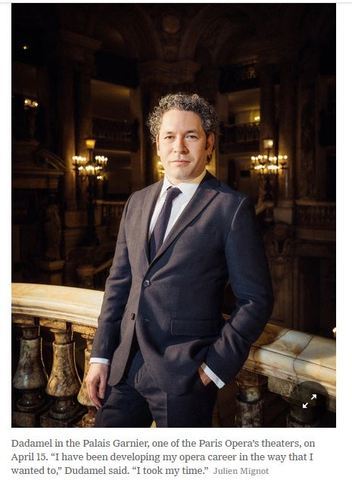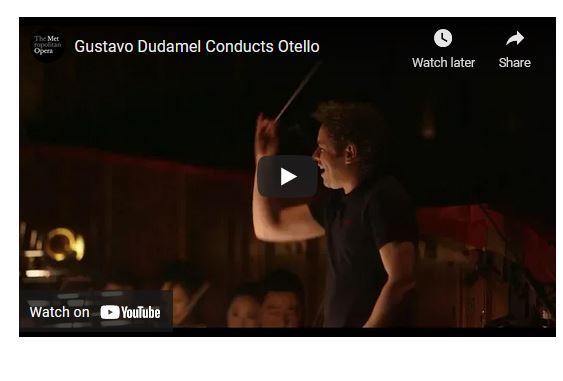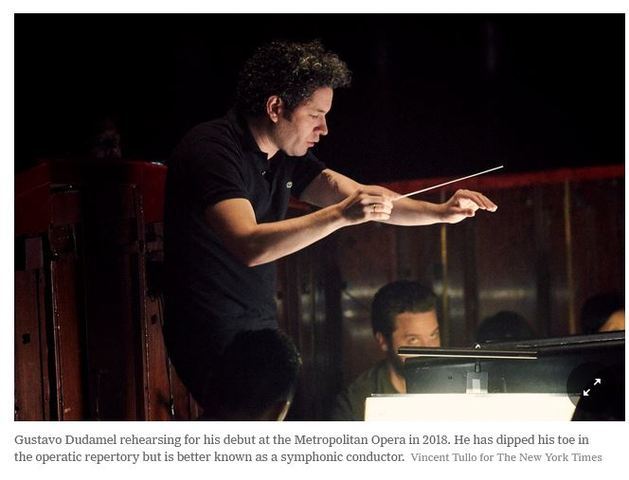In a coup, the venerable company has hired as its next music director the rare classical artist to have crossed into pop-culture celebrity.



By Zachary Woolfe and Laura Cappelle
April 16, 2021Updated 6:30 a.m. ET
When Alexander Neef was named the next director of the mighty Paris Opera in 2019, he did not have a particular candidate in mind to succeed the company’s music director, who was leaving after a decade. “I felt I should consult with the musicians,” Neef said by phone recently, “and see who for them, what for them, how for them the future looked like.”
One surprising name kept coming up in those conversations: the superstar conductor Gustavo Dudamel, the musical leader of the Los Angeles Philharmonic since 2009 and the rare classical artist to have crossed into pop-culture celebrity.
He had made his Paris debut in 2017, with “La Bohème,” and hit if off. “I felt this connection with the house, the musicians, the choir, with the whole team,” Dudamel recalled in an interview on Thursday at the company’s ornate Palais Garnier theater. “I was here for one month and a half and I was feeling like I was at home.”
Yet it still seemed an unlikely marriage, given Dudamel’s packed schedule and the fact that, even if that “Bohème” was a success, it had still been his only engagement with the company. Indeed, while he has dipped his toe into the operatic repertory in Los Angeles, at the Metropolitan Opera and elsewhere, he has been largely known as a symphonic conductor.
“But I thought,” Neef recalled, “why not ask?”
That ask eventually resulted in a coup for the company, which announced on Friday morning that Dudamel would be its next music director, starting in August for an initial term of six years, overlapping for much of that period with the Los Angeles position, where his current contract runs through the 2025-26 season.
The appointment marks a turning point in the heady career of an artist who made his name as a wunderkind with orchestras in North and South America and is now, at 40, taking the reins at one of Europe’s most venerable opera companies, founded in 1669 as the Académie d’Opéra by Louis XIV.
Dudamel said he had not required much convincing when Neef offered him the permanent position.
“It’s a big and beautiful responsibility,” he said.
Dudamel — who was born in Venezuela in 1981 and was trained there by El Sistema, the free government-subsidized program that teaches music to children, including some in its poorest areas — occupies a unique position in music. He is sought by leading orchestras, including the Berlin Philharmonic and Vienna Philharmonic. But he also appeared in a Super Bowl halftime show; was the classical icon Trollzart in the animated film “Trolls World Tour”; is conductor of the score for Steven Spielberg’s upcoming film version of “West Side Story”; and inspired a messy-haired main character in the Amazon series “Mozart in the Jungle.” In 2019 he received a star on the Hollywood Walk of Fame.
His renown will surely be a shot in the arm for the Paris Opera, which like other arts organizations is warily eyeing the need to reintroduce itself to its core audience after the long closures of the pandemic, at the same time as it aims to capture new operagoers. Handsomely subsidized by the French government, the company has expanded its audience in recent years, but still faces the pressure of roiling debates about racial representation and the relevance of expensive-to-produce classical art forms.
“Our future is not validated by our history,” Neef said. “This Covid crisis has put us in a pressure cooker and reinforced and amplified the need to give people real artistic reasons for why we need to exist, why this has value.”
He added that Dudamel was “already a very credible ambassador for that. What he’s done successfully is, he’s broken down barriers.”
It is no longer the norm — especially outside German-speaking countries — for opera music directors to start as pianists and singer coaches and work their way up through the ranks, as Philippe Jordan, 46, Dudamel’s predecessor in Paris, did. While Dudamel lacks that upbringing in the nuances and logistical complexities of the art form, and his operatic appearances have been sporadic, he is not unknown at major houses. He made his Teatro alla Scala debut in 2006, when he was in his mid-20s, and had his first appearance with the Berlin State Opera the following year. He first conducted at the Vienna State Opera in 2016, and at the Met in 2018, with Verdi’s “Otello”; on Wednesday he finished a run of “Otello” in Barcelona.
“I have been developing my opera career in the way that I wanted to do, and I feel very good about that,” he said. “I took my time.”
Neef pointed out that Yannick Nézet-Séguin, 46, the Met’s music director since 2018, did not start there with an enormous repertory, either. “The question is not about quantity,” Neef said. “And these things are a little bit deceptive: When you look at the list of operas Gustavo has conducted, it’s from Mozart to John Adams. He’s been conducting opera as long as he’s been conducting symphonic music.”
Asked which works he is most looking forward to tackling, Dudamel replied, “Everything.” In Paris this fall he is scheduled to conduct Puccini’s “Turandot” and Mozart’s “Le Nozze di Figaro.” In addition to mainstream repertory, he said he hoped to work with living composers from Europe as well as North and South America, including Adams, Thomas Adès and Gabriela Ortiz.
He added that he is keen to conduct the Paris Opera Ballet, the company’s in-house dance company. Dudamel said his mentor, José Antonio Abreu, the founder of El Sistema, often took him to the ballet to learn about conducting.
“It was part of my education,” he said. “Even for my way of seeing the music.”
His appointment will involve significant travel between Paris and Los Angeles, but his commitment to the Philharmonic is one Dudamel said he has no intention of curtailing. “I will share my time between the two families,” he said. What he will cut back on is guest conducting, a process he said he started a few years ago in order to shift his focus to longer-term projects.
“The way we’re going to organize it is the way he works in L.A., too,” Neef said. “Long periods that hang together, rather than a lot of travel.”
Neef added that Dudamel would be a charismatic and visible link between the company’s main stage productions and its educational endeavors. In Los Angeles, Dudamel has contributed to the Philharmonic’s robust educational outreach, especially the Youth Orchestra Los Angeles, a program inspired by El Sistema that was founded in 2007.
He also continues to also hold the post of music director of the Simón Bolívar Symphony Orchestra of Venezuela, but after he criticized the Venezuelan government in 2017, the country canceled his planned international tour with that ensemble. While he has not been able to perform with the Simón Bolívar since then, he still works with it remotely and has sometimes met outside Venezuela with groups of its players; during the pandemic he has had sessions with them over Zoom.
His appointment comes two months after the release of a report on discrimination and diversity at the Paris Opera. The report focused on changes to the repertory, school admissions process and racial and ethnic makeup of the ballet company. At the same time, opera companies around the world have been called on to make their staffs, artists and productions more representative.
Dudamel said in the interview that he would press for that conversation to continue at the Paris Opera over the long term. “Sometimes we pretend to do changes,” he said, snapping his fingers to indicate overly fast decisions. “In that way, you cannot develop something that is strong for the future.”
Neef said that alongside Ching-Lien Wu, the company’s recently appointed (and first female) chorus master, Dudamel’s hiring was part of an effort to change the face of the company’s executive ranks and how it thinks about diversity and equity.
“It’s already what he lives and who he has been in L.A. and other places,” Neef said. “I think there’s great opportunity to be gained from that experience for us, to have someone with that experience at the table at the highest level.”
The next step is for Dudamel to learn French. “I’m starting!” he said, before adding, “I’m very bad with languages.”
One carrot will be the opportunity to finally read one of his favorite books — Rousseau’s “Confessions,” which he discovered as a teenager and brings with him everywhere — in the original. “I will try,” Dudamel said, smiling.
https://www.nytimes.com/2021/04/16/arts ... opera.html